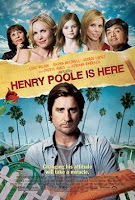Henry Poole is Here (****)
 Directed By: Mark Pellington
Directed By: Mark PellingtonStarring: Luke Wilson, Radha Mitchell, Adriana Barazza, George Lopez
Seen: September 21st 2008
**** Out of ****
Henry Poole (Wilson) moves into a new neighbourhood (his old neighbourhood where he grew up, in fact), and immediately we see he simply wants to be the loner, he is polite with everyone, but in a very brusque manner. Why, you may ask? Henry Poole has a debilitating disease (the most we hear of it during the movie), and just wants to be left alone. At the local convenience store the girl helping asks if he’s sad or angry, to which he asks her in an almost rude way: “Why do you want to know why I’m sad and angry?” to which she replies: “So you’re sad and angry?”
His neighbour Esperanza sees the face of Jesus in a water stain on the side of his home, and she immediately tries to convert him to the idea that this is a miracle, and even though he stubbornly refuses the fact, she doesn’t give up. She brings people to his house while he’s out, and this brings some sweet humour to the story – Henry telling a group of old women he’s disappointed in them for not having grown smarter over their long years, and then telling the one that looks the oldest he’s especially disappointed in her.
His other neighbour, Dawn Stupek (Mithcell), lives with her young daughter, Millie, who hasn’t spoken a word since her dad disappeared (we also don’t learn the whole story here, did he die, or just leave?). Dawn starts luring Henry out bit by bit, and a timid relationship starts developing between the two, with Millie still quiet as a mouse.
But small miracles (interpretation of these can range) start happening around the sained wall, and Henry is forced to deal with the truth (or something else?) more and more. He stays stubborn, however, but the events around him unfold in the most moving of ways, Dawn at one stage asking/telling him that it must get harder for him to remain unbelieving / unyielding.
The film is truly moving, and saying much more would rob the film of some of its magic. The film does not preach to anyone, but it does deal with a sense of spiritual awakening in the lives of multiple characters. And as to Henry’s final opinion/belief? That question is left to the viewer.


Comments